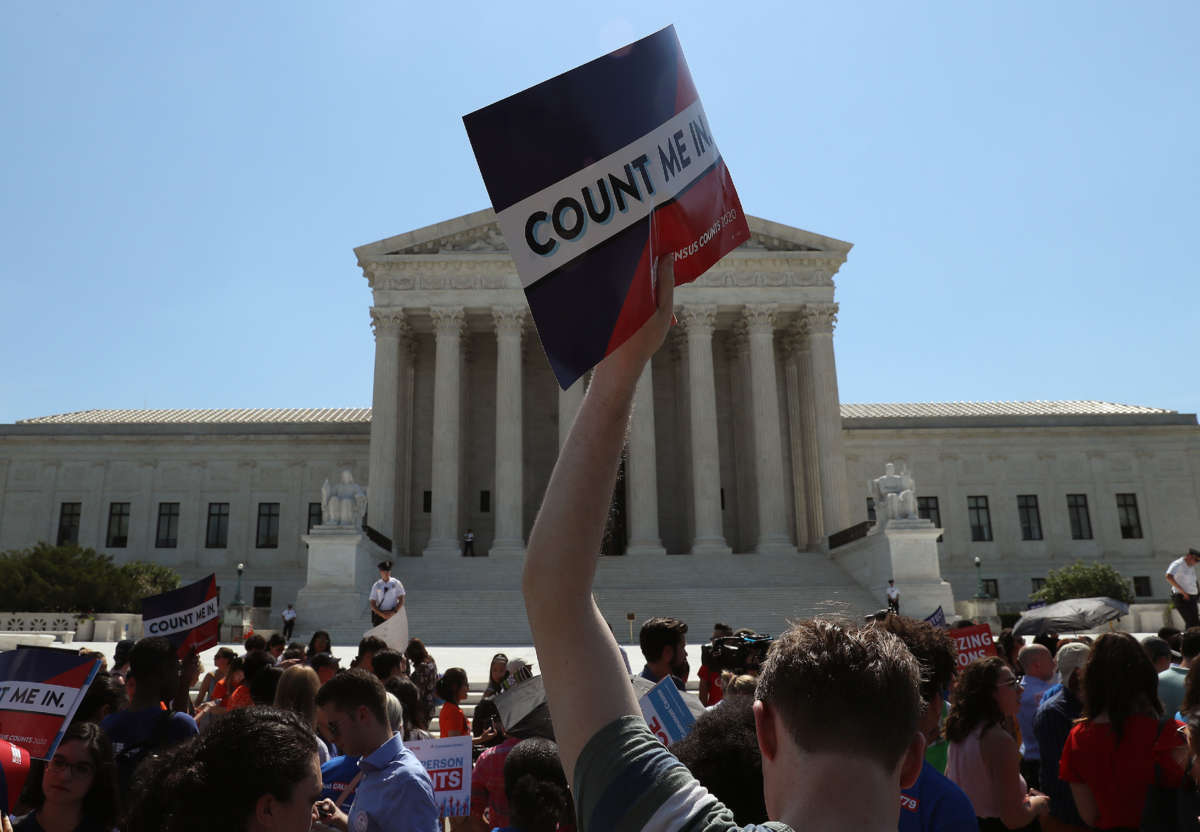Did you know that Truthout is a nonprofit and independently funded by readers like you? If you value what we do, please support our work with a donation.
The United States Supreme Court ruled on Friday that it would not decide a case involving how undocumented immigrants are counted in the U.S. Census. The ruling means that a Trump administration plan requiring two separate tabulations for the census — one that includes every person residing in the U.S. and another that excludes undocumented immigrants — can move forward for now.
The court stated that it was “premature” to come to a decision on the Trump administration’s alterations to the census.
If the alterations go into effect, they could result in profound changes to how states are apportioned members of Congress. However, the Supreme court stated in its ruling that if the Trump administration decides to use the census changes to determine how many representatives each state is apportioned in Congress (or how federal funds and programs are distributed across the country), litigants can bring forward a lawsuit at that time, the Court said.
In short, the Court ruled that litigants challenging the Trump administration’s planned changes didn’t have legal injury required to sue quite yet.
The three liberal bloc members of the Court disagreed with the ruling, with Justice Stephen Breyer delivering a blistering dissent against it.
“The plain meaning of the governing statutes, decades of historical practice, and uniform interpretations from all three branches of Government demonstrate that aliens without lawful status cannot be excluded from the decennial census solely on account of that status,” Breyer wrote. “The Government’s effort to remove them from the apportionment base is unlawful, and I believe this Court should say so.”
“Where, as here, the government acknowledges it is working to achieve an allegedly illegal goal,” Breyer went on to write, “this court should not decline to resolve the case simply because the government speculates that it might not fully succeed.”
Dale Ho, a lawyer with the American Civil Liberties Union (ACLU) who represents a number of the challengers to the Trump administration’s proposed policy, expressed that he doesn’t view the ruling on Friday as a loss.
“This Supreme Court decision is only about timing, not the merits. This ruling does not authorize President Trump’s goal of excluding undocumented immigrants from the census count used to apportion the House of Representatives,” Ho said in a statement.
“This fight isn’t over. If this policy is actually implemented, we’ll see them right back in court,” the official ACLU Twitter account tweeted.
The basis for making the changes to apportionment that President Donald Trump proposed in a memorandum authored in July indeed cuts against both law and precedent. The census, and how it is used to apportion House seat counts in each state, is laid out plainly in the 14th Amendment of the U.S. Constitution, which states that representatives are apportioned based on “counting the whole number of persons” — not citizens — “in each state.” Noncitizens are not explicitly excluded in the amendment’s wording.
Changes to how apportionment works, if it did go through, could result in as many as three states losing — and three other states gaining — seats in the House of Representatives.
If Trump does indeed attempt to change the apportionment numbers, a lawsuit would undoubtedly be refiled by the litigants of this case. It’s possible that President-elect Joe Biden, too, could reverse the attempt by Trump, if the case is not settled by the time he is inaugurated.
Trump is silencing political dissent. We appeal for your support.
Progressive nonprofits are the latest target caught in Trump’s crosshairs. With the aim of eliminating political opposition, Trump and his sycophants are working to curb government funding, constrain private foundations, and even cut tax-exempt status from organizations he dislikes.
We’re concerned, because Truthout is not immune to such bad-faith attacks.
We can only resist Trump’s attacks by cultivating a strong base of support. The right-wing mediasphere is funded comfortably by billionaire owners and venture capitalist philanthropists. At Truthout, we have you.
Truthout has launched a fundraiser to raise $41,000 in the next 7 days. Please take a meaningful action in the fight against authoritarianism: make a one-time or monthly donation to Truthout. If you have the means, please dig deep.
